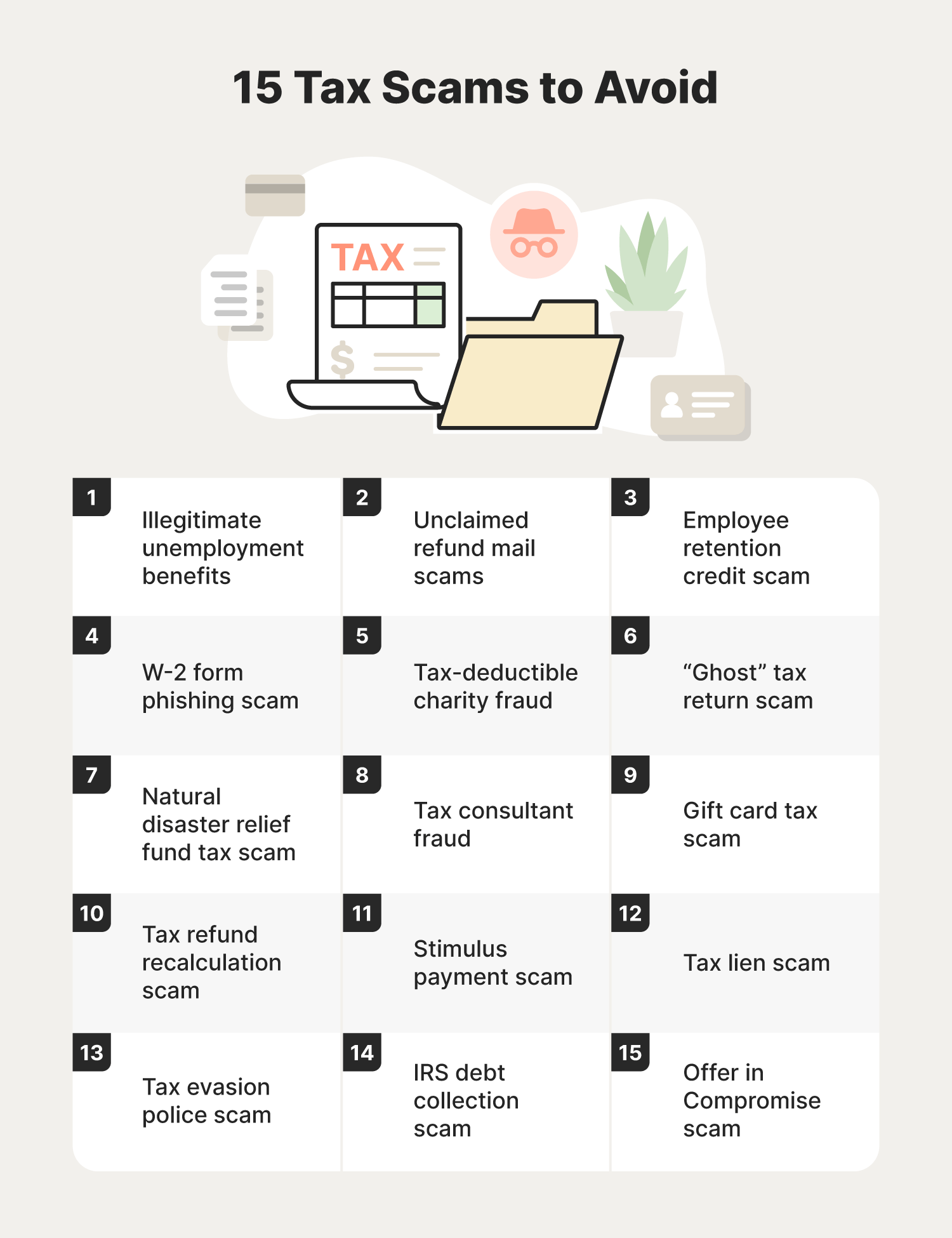Tax scammers target people throughout the year, but they’re particularly active around tax season. Falling victim to a tax scam can leave you at risk of fraud, financial losses, and the potentially devastating consequences of identity theft. However, by learning about the approaches scammers use, staying vigilant, and applying protective strategies, you can help keep your finances and identity safer.
Read on to discover 15 of the most common tax scams to watch out for this tax season, including some listed in the IRS’ Dirty Dozen, and what you can do to protect against them.


1. Illegitimate unemployment benefits
Illegitimate unemployment benefits scams often begin with scammers acquiring sensitive information through means like data breaches or phishing attacks. If a scammer is able to steal enough of your personal information, including your Social Security number, they could submit fraudulent unemployment claims on your behalf to illegally receive government benefits.
What scammers might say: "Hello, this is the IRS contacting you to confirm your details. We believe your information may have been compromised in a data breach. Please confirm your Social Security number and address to secure your data."
2. Unclaimed refund mail scams
Unclaimed refund mail scams involve criminals trying to trick you into thinking you have an unclaimed tax refund. You’ll typically receive a document outlining the fake refund in a cardboard envelope delivered by mail. The letter may have a convincing IRS masthead but will include contact details that don’t belong to the IRS. If you contact the scammer and provide personal details, you could fall victim to identity theft.
What scammers might say: "We’re contacting you in relation to your unclaimed refund. We need your personal information to finish processing it. Please call or email us using the contact details provided in this letter."
3. Employee retention credit scams
Third-party promoters often advertise their services or send direct mail campaigns about the Employee Retention Tax Credit (ERTC), but these can sometimes be scams. Fraudsters exaggerate who qualifies for the credit and charge upfront fees to help you claim it. If you receive the credit but aren’t eligible, you’ll end up having to repay it and won’t get your fees back. Before applying, check the ERTC requirements.
What scammers might say: "We’re writing to inform you that you qualify for the Employee Retention Tax Credit. If you would like us to process this for you, simply pay the fee below."
4. W-2 form phishing scams
The W-2 phishing scam typically involves scammers targeting HR or finance employees in a business to get access to W-2 forms. They might do this by pretending to be someone senior in the organization, like the CEO or CFO. If the target employee falls for the scam and sends W-2 forms, the fraudster will have access to sensitive information like names, addresses, and Social Security numbers that they can use in tax fraud or identity theft.
What scammers might say: "It’s Greg, I need everyone’s W-2s ASAP in one file. We’re being investigated by the IRS and I need to assure them all the forms were completed correctly."
5. Tax-deductible charity fraud
This type of charity scam happens when criminals scam money from well-intentioned people by posing as legitimate charities and requesting donations, claiming they’ll be tax deductible. If you send them money, your funds won’t help your intended cause and you won’t be able to deduct your donation on your tax return because the money didn’t go to a registered charity.
What scammers might say: "Make a tax-deductible donation to our charity and receive generous tax benefits while helping people in need.”
6. “Ghost” tax return scams
In this scam, unethical tax return preparers, or “ghost preparers,” don’t sign the tax returns they prepare. They will usually charge you fees based on the size of the refund you receive. But you could end up in trouble thanks to bogus deductions and other shifty practices they use to inflate your refund — and their commission.
What scammers might say: "As professional tax preparers, we guarantee we can double your refund. And for your convenience, we manage everything online."
7. Natural disaster relief fund tax scams
Disaster relief fund tax scams capitalize on the aftermath of catastrophic events by claiming to assist affected communities. Scammers may masquerade as government agencies and promise financial aid to those impacted by a natural disaster, requesting donations that they claim are tax deductible. These fraudulent schemes aim to deceive victims into providing personal information online or paying into non-existent relief funds.
What scammers might say: “Support disaster relief efforts by donating to our local fund for survivors. For a fast donation, pay with a cash app or in gift cards.”
8. Tax consultant fraud
Fraudulent individuals or firms can pose as knowledgeable tax professionals or tax preparers offering services to assist you with your tax obligations. These fake tax consultants may promise to minimize your tax liabilities or maximize your refunds. If you use their services, you may face audits, penalties, or legal action due to inaccurate filings or tax avoidance. Alternatively, the scammer might direct your refund to their account.
What scammers might say: "Hello, I'm a tax consultant offering exclusive services to minimize your tax liabilities and maximize your refunds. Just provide your personal and financial information, and I'll handle the rest."
9. Gift card tax scams
This form of gift card scam is common around the holiday season and usually begins with a scammer asking you to pay a fake tax bill with gift cards. The most common way that con artists request gift cards is over the phone but they also use text messages, emails, or social media.
What scammers might say: "We're calling from the IRS, and you owe back taxes. To avoid arrest, purchase $200 in gift cards and provide the codes for immediate payment."
10. Tax refund recalculation scams
In the refund recalculation scam, criminals will contact you to say they recalculated your IRS refund and you are due more money. The message may ask you to click a link to claim your refund, but you’ll instead be directed to a fake web page that installs malware on your device or requests your bank account information.
What scammers might say: "We’ve recalculated your tax refund and need your bank details to return the difference. Please enter your bank account details to expedite the process."
11. Stimulus payment scams
The stimulus payment scam involves scammers claiming that you’re eligible for a stimulus payment and requesting you click a link to provide personal and financial details. Instead, you’ll be led to a fake web page designed to steal your sensitive information or request a processing fee. Since you don’t have to pay a fee to receive a stimulus check, scammers are ultimately trying to steal your identity or money.
What scammers might say: "To claim your stimulus payment, provide your Social Security number and pay a small processing fee. Act fast to ensure you don't miss this opportunity."
12. Tax lien scams
In this mail tax scam, fraudsters pose as a fake agency with a convincing name like the “Bureau of Tax Enforcement” in a letter that threatens you with an IRS lien or levy. If you don’t owe taxes you should scan the letter and send it to phishing@irs.gov. If you’re not sure whether you owe taxes, you can confirm whether the request is legitimate by calling the IRS at 1-800-829-1040.
What scammers might say: "To avoid a federal tax lien, pay your tax debt in full now."
13. Tax evasion police scams
Scammers may impersonate law enforcement officers, claiming to be contacting you on behalf of the tax authorities and accusing you of tax evasion. They may use tactics like threats of arrest, imprisonment, deportation, or imminent legal action to scare you into providing sensitive information or making a payment. If you comply with their demands, you could end up facing an uphill battle to recover from identity theft.
What scammers might say: "This is Officer Smith from the IRS Criminal Investigation Unit. You're under investigation for tax evasion, and a warrant will be issued for your arrest unless you settle your outstanding tax debt immediately."
14. IRS debt collection scams
The IRS debt collection scam happens when criminals pose as the IRS and claim you owe back taxes, penalties, or interest, and insist that failure to pay will result in severe consequences. These fraudsters may contact you by phone, spoofing their caller ID to make it look like they’re calling using an official IRS number. They may also request that you use payment methods like Zelle, which the IRS would never accept.
What scammers might say: "Hello, this is the IRS calling to inform you that you have an outstanding tax debt. Failure to settle immediately will result in legal action, including arrest or asset seizure."
15. Offer in Compromise scams
An Offer in Compromise (OIC) tax scam tricks you into paying upfront fees with the promise of settling your tax debt for less than the full amount. The IRS offers legitimate OIC programs, but scammers exaggerate your chances of qualifying and pocket your money without helping you negotiate with the IRS.
What scammers might say: "You owe the IRS money and they’re preparing to seize your assets. Let us help you eliminate 100% of your tax debt for pennies on the dollar.”
How to spot tax scams
The best way to increase your chances of avoiding tax scams is knowing how to spot them. That starts with understanding the specific approaches scammers use, but it also involves knowing what general red flags to look out for in messages, letters, emails, or phone calls claiming to be from the IRS.
Here are some key warning signs that you’re being targeted in a tax scam:
- Unsolicited communication: Be wary of unsolicited phone calls or emails claiming to be from the IRS. The IRS will always send a letter or notice in the mail before getting in touch with you via any other channel. If you haven’t received a letter, anyone reaching out to you claiming to be from the IRS is likely to be a scammer.
- Pressure tactics: Scammers often use pressure tactics, such as threats of arrest or financial damages, to intimidate victims into providing personal information or making payments. Don’t be pressured into acting quickly, and take the time to call the IRS if you’re ever in doubt.
- Payment requests: The IRS will never demand immediate payment for a tax shortfall or request payment via unconventional methods like gift cards or payment apps. Treat contact from anyone asking for immediate payment as a red flag that you’re being scammed and only ever pay your taxes through the official payments page on the IRS website.
- Phony email requests: Be cautious of emails claiming to be from the IRS and avoid clicking any links or opening attachments. The IRS will never request personal information over email, and they won’t email you at all before first informing you via a letter or notice in the post.
- Fraudulent messages: The IRS will never initiate contact via a text or social media message. Any messages you receive on your phone, Facebook account, or Instagram account claiming to be from the IRS and asking for personal information or direct payment should ring alarm bells.
- Unofficial tax forms: Verify the legitimacy of any IRS forms or notices that you receive in the mail or via email by checking the official IRS website or contacting the IRS directly. Don’t fill in and return forms that you’re suspicious of without ensuring they’re real.
- Threats and intimidation: The IRS cannot revoke a driver’s license, business license, or immigration status, and will never make a threat to do so. If you’re contacted by someone claiming to be from the IRS who threatens you with punishment if you don’t comply, you’re probably being scammed.
If you’re ever suspicious, remember to verify the legitimacy of a communication claiming to be from the IRS before acting. And if you discover that you’ve been targeted by a scam, report it to the IRS and file a fraud report with the FTC to help prevent others from falling victim in the future.
Protect against tax scams
Understanding how tax scams work and identifying key warning signs can help protect you against falling victim to fraud or identity theft. For extra protection, join LifeLock Standard. You’ll get access to a range of features including credit monitoring and Social Security number alerts that can help you detect fraud early, so you can take action to safeguard your finances and identity.
FAQs
What are the warning signs of tax scams?
Warning signs of tax scams include being contacted by someone claiming to be from the IRS when you haven’t received a letter in the mail first, requests for immediate payment using unusual methods like payment apps or gift cards, and threats of arrest or legal action.
How do I know if I got scammed on my taxes?
You may have been scammed on your taxes if you discover unauthorized transactions, receive notices from the IRS about unreported income, or are sent records of a duplicate tax return. If you notice these signs, call the IRS directly to discuss the problem and get guidance on what to do.
How will the IRS contact you?
The IRS primarily contacts taxpayers by mail — or by phone after first sending a letter notifying you that they’ll call. They will never initiate contact with a phone call, text message, or social media message.
What do I do if I become a victim of IRS tax scams?
If you fall victim to an IRS scam, report it to the IRS, freeze your credit, and monitor your key financial accounts and credit report for suspicious activity. Reporting IRS tax scams can help prevent others from falling victim in the future.
What was the COVID-19 relief fund tax scam?
The COVID-19 relief fund tax scam took advantage of individuals and businesses in a crisis. Exploiting government aid and relief programs, scammers posed as official entities offering assistance to those affected by the pandemic. They promised financial aid or tax relief but aimed to deceive victims into disclosing personal information.
Editor’s note: Our articles provide educational information. LifeLock offerings may not cover or protect against every type of crime, fraud, or threat we write about.
This article contains
- 1. Illegitimate unemployment benefits
- 2. Unclaimed refund mail scams
- 3. Employee retention credit scams
- 4. W-2 form phishing scams
- 5. Tax-deductible charity fraud
- 6. “Ghost” tax return scams
- 7. Natural disaster relief fund tax scams
- 8. Tax consultant fraud
- 9. Gift card tax scams
- 10. Tax refund recalculation scams
- 11. Stimulus payment scams
- 12. Tax lien scams
- 13. Tax evasion police scams
- 14. IRS debt collection scams
- 15. Offer in Compromise scams
- How to spot tax scams
- Protect against tax scams
- FAQs
Start your protection,
enroll in minutes.
LifeLock is part of Gen – a global company with a family of trusted brands.
Copyright © 2026 Gen Digital Inc. All rights reserved. Gen trademarks or registered trademarks are property of Gen Digital Inc. or its affiliates. Firefox is a trademark of Mozilla Foundation. Android, Google Chrome, Google Play and the Google Play logo are trademarks of Google, LLC. Mac, iPhone, iPad, Apple and the Apple logo are trademarks of Apple Inc., registered in the U.S. and other countries. App Store is a service mark of Apple Inc. Alexa and all related logos are trademarks of Amazon.com, Inc. or its affiliates. Microsoft and the Window logo are trademarks of Microsoft Corporation in the U.S. and other countries. The Android robot is reproduced or modified from work created and shared by Google and used according to terms described in the Creative Commons 3.0 Attribution License. Other names may be trademarks of their respective owners.






